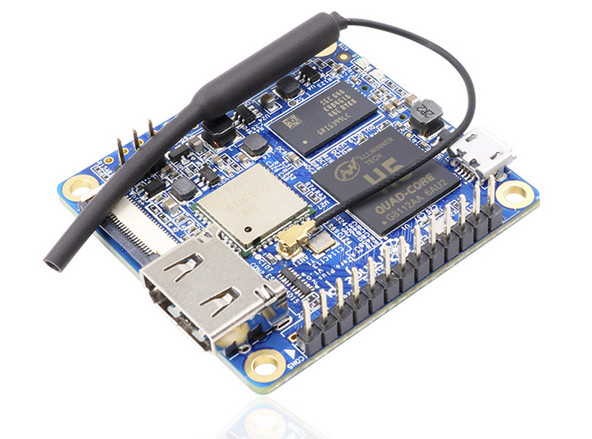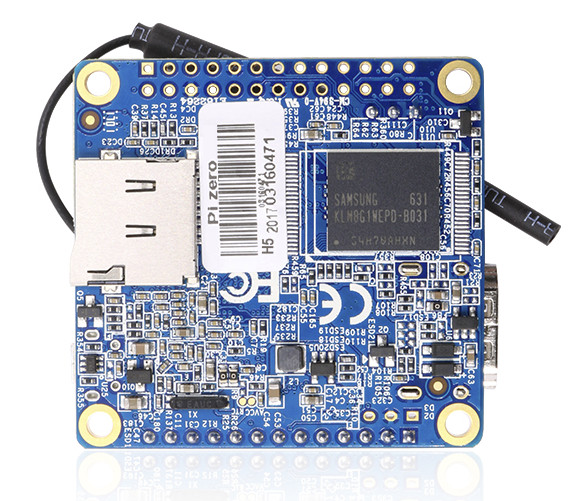It’s hard to keep up, but Shenzhen Xunlong has launched another Orange Pi board, as two weeks after introducing Orange Pi Zero Plus 2 development board, the company has now introduced “Orange Pi Zero Plus 2 H5” board, with the exact same specification, except Allwinner H3 quad core Cortex A7 32-bit processor has been replaced by Allwinner H5 quad core Cortex A53 64-bit processor.
 Orange Pi Zero Plus 2 H5 board specifications:
Orange Pi Zero Plus 2 H5 board specifications:
- SoC – Allwinner H5 quad core Cortex A53 processor with 2+4 core Mali-450MP4 GPU
- System Memory – 512 MB DDR3 SDRAM
- Storage – 8GB eMMC flash + micro SD card slot
- Video Output – HDMI port
- Connectivity – 802.11 b/g/n WiFi + Bluetooth 4.0 LE (Ampak AP6212) with u.FL antenna connector and external antenna
- USB – 1x micro USB OTG port
- Camera – MIPI CSI port
- Expansion headers – Unpopulated 26-pin “Raspberry Pi B+” header + 13-pin header with headphone, 2x USB 2.0, TV out, microphone and IR receiver signals
- Debugging – 3-pin serial console header
- Misc – 2x LEDs for power and status
- Power Supply – 5V via micro USB port
- Dimensions – 48 x 46 mm
- Weight – 20 grams
 Allwinner H5 is pin-to-pin compatible with Allwinner H3, so the PCB is exactly the same. The upgrade brings slightly better CPU performance, as well as – in theory – better GPU performance, but the latter might not be usable right now (in Linux) due to a lack of software support. Power consumption might be a little higher too (TBC).
Allwinner H5 is pin-to-pin compatible with Allwinner H3, so the PCB is exactly the same. The upgrade brings slightly better CPU performance, as well as – in theory – better GPU performance, but the latter might not be usable right now (in Linux) due to a lack of software support. Power consumption might be a little higher too (TBC).
The company claims support for Android, Ubuntu, Debian, and “Raspbian”, but I can’t double check since their website won’t load (yet again). Armbian will likely have Ubuntu Xenial nightly images with mainline Linux ready soon, like they did for NanoPi NEO 2 and Orange Pi PC 2, and while they are usable for some applications, you should not expect everything to work just yet.
The board costs just $1 more than the H3 version, as it sells for $19.90 + shipping on Aliexpress.

Jean-Luc started CNX Software in 2010 as a part-time endeavor, before quitting his job as a software engineering manager, and starting to write daily news, and reviews full time later in 2011.
Support CNX Software! Donate via cryptocurrencies, become a Patron on Patreon, or purchase goods on Amazon or Aliexpress




